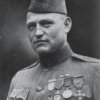SERB WORLD USA March/April 2008 Vol. XXIV, no. 4
- “Kosovo Plain: The Balkan Crossroads” by Dr. Vojislav Radovanovic (1925), translated by Serb World U.S.A.
- “The Diverse Land of Kosovo-Metohija” a map drawn by Philip D. Hart
- “1925: More about Kosovo”
- “Mary Budimirovich Korach: One of the ‘Greatest Generation’”
- “Letters to Jovan” Jovan Radovich’s letters from Kameno, Herceg Novi, in 1895
- “Of Interest” a regular feature of 2 to 5 pages of short items about events, facts, awards
- Recipe: “‘Kifle,’ Classic Serbian Pastry”
- “Milan Opacich Presents ‘The Legendary Steve Makarevich’”
- “‘My Crna Gora,’ a poem” by Collin Janich
- “The ‘Guslar’ and the ‘Vila’: A Tale from Old Serbia” by Martin D. Bassar, illustrations by B. Malczewski
- “‘Coup d’Etat’ on the Eve of War: March 27, 1941” by Philip D. Hart
- “Zivan Knezevich: a short biography”
- “Repudiation of the Tripartite Pact by the Serbian People” by Colonel Zivan Knezevich
SERB WORLD USA January/February 2008 Vol. XXIV, no. 3
- “The Danube: War, Commerce, and Regulation” by Philip D. Hart
- “The Danube River and the Danube States” a map drawn by Philip D. Hart
- “Milo J. Radulovich: ‘Glory to him... he, indeed, had reason to be born.’—Njegoss” by George J. Vuckovich
- “Cveta Popovich and His Postcard Collection”
- “Postcards from Cveta Popovich: The 1912 Sokol Festival in Prague” from the Cveta and Milosh Popovich Collection
- “1929: Serbians, Noted for Their Valor, Make Good Indianapolis Citizens” by Grace Blaisdell Holden, “Indianapolis Sunday Star,” November 29, 1929
- “Of Interest” a regular feature of 2 to 5 pages of short items about events, facts, awards
- “Mary Nicklanovich (1919-2007): recipes and much more”
- Recipe: “Apple Strudel”
- “From Glusac’s ‘The Music of Yugoslavia’— ‘Ej, salasi’” a song from the collection of Peter Glusac, translation by Serb World U.S.A.
- “Milan Opacich Presents ‘Tamburitza Jammin’ in Tonawanda’”
- “Serbs ‘Tops’ Down Under” by Holly Sakrison Clark
- “From Cetinje to San Diego: The Long Journey of Father B. Draskovic” by Marsha Jovanovic
- “More About the Sajkas Battalion: Its Officers and Their Service”
- “South Slav Officers: a list from the Sajkas Battalion (1763-1872)” from a document published by S. Gavrilovic, trans. from German by G. Kosich




